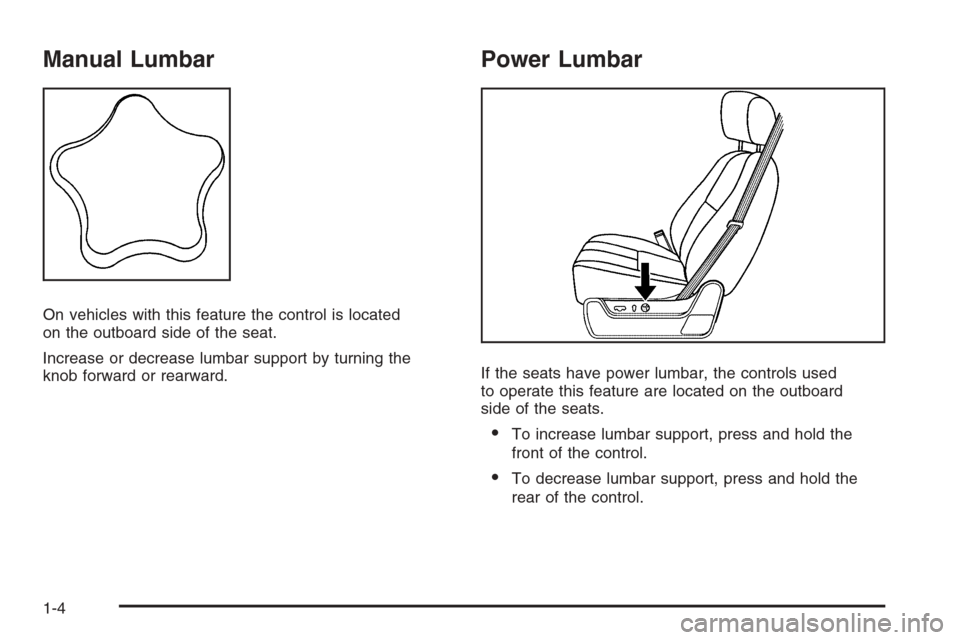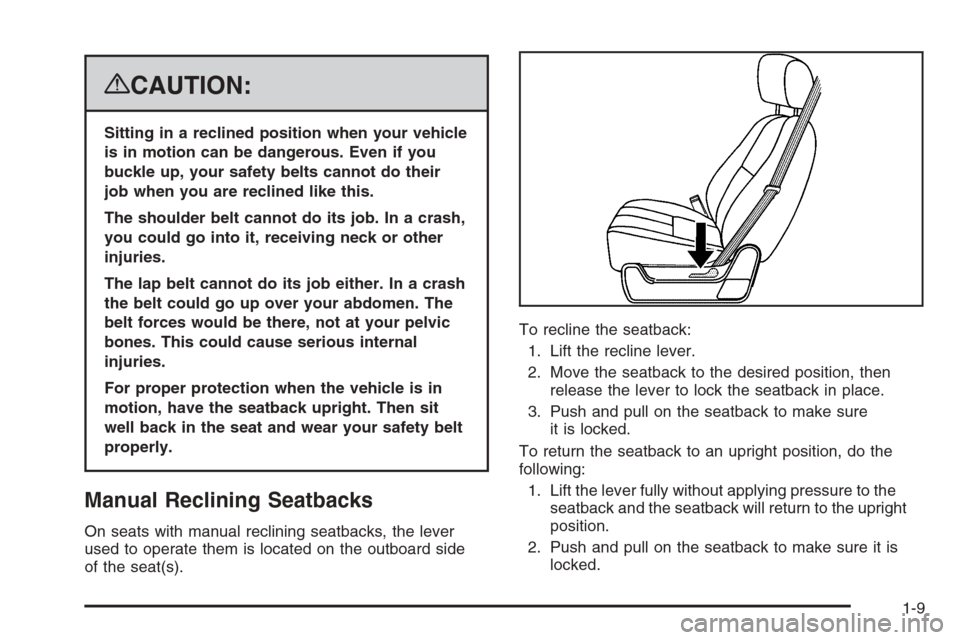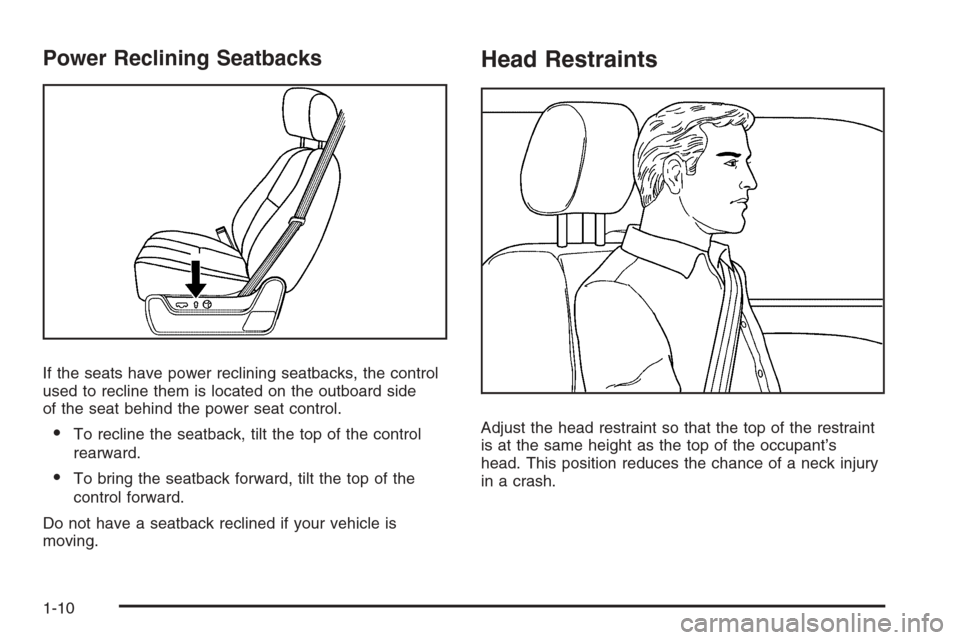2008 CHEVROLET TAHOE seats
[x] Cancel search: seatsPage 1 of 538

Seats and Restraint Systems........................... 1-1
Front Seats
............................................... 1-2
Rear Seats
..............................................1-12
Safety Belts
.............................................1-29
Child Restraints
.......................................1-50
Airbag System
.........................................1-76
Restraint System Check
............................1-92
Features and Controls..................................... 2-1
Keys
........................................................ 2-3
Doors and Locks
......................................2-10
Windows
.................................................2-18
Theft-Deterrent Systems
............................2-20
Starting and Operating Your Vehicle
...........2-24
Mirrors
....................................................2-47
Object Detection Systems
..........................2-56
OnStar
®System
......................................2-59
Universal Home Remote System
................2-62
Storage Areas
.........................................2-70
Sunroof
..................................................2-73Instrument Panel............................................. 3-1
Instrument Panel Overview
.......................... 3-4
Climate Controls
......................................3-22
Warning Lights, Gages, and Indicators
........3-34
Driver Information Center (DIC)
..................3-51
Audio System(s)
.......................................3-75
Driving Your Vehicle....................................... 4-1
Your Driving, the Road, and the Vehicle
....... 4-2
Towing
...................................................4-45
Service and Appearance Care.......................... 5-1
Service
..................................................... 5-3
Fuel
......................................................... 5-5
Checking Things Under the Hood
...............5-14
Rear Axle
...............................................5-54
Four-Wheel Drive
.....................................5-55
Front Axle
...............................................5-56
Headlamp Aiming
.....................................5-58
Bulb Replacement
....................................5-61
Windshield Wiper Blade Replacement
.........5-64
2008 Chevrolet Tahoe, Suburban Owner ManualM
Page 7 of 538

Front Seats......................................................1-2
Manual Seats................................................1-2
Power Seats..................................................1-3
Manual Lumbar..............................................1-4
Power Lumbar ...............................................1-4
Heated Seats.................................................1-5
Memory Seat, Mirrors, and Pedals....................1-6
Reclining Seatbacks........................................1-8
Head Restraints............................................1-10
Center Seat.................................................1-11
Rear Seats.....................................................1-12
Heated Seats...............................................1-12
60/40 Split Bench Seat (Second Row).............1-12
Bucket Seats (Second Row)...........................1-18
Third Row Seat............................................1-25
Safety Belts...................................................1-29
Safety Belts: They Are for Everyone................1-29
How to Wear Safety Belts Properly.................1-34
Lap-Shoulder Belt.........................................1-42
Safety Belt Use During Pregnancy..................1-48
Lap Belt......................................................1-48
Safety Belt Extender.....................................1-50
Child Restraints.............................................1-50
Older Children..............................................1-50
Infants and Young Children............................1-54Child Restraint Systems.................................1-57
Where to Put the Restraint.............................1-59
Lower Anchors and Tethers for
Children (LATCH)......................................1-61
Securing a Child Restraint in a
Rear Seat Position....................................1-69
Securing a Child Restraint in the
Center Front Seat Position..........................1-72
Securing a Child Restraint in the
Right Front Seat Position............................1-72
Airbag System...............................................1-76
Where Are the Airbags?................................1-78
When Should an Airbag In�ate?.....................1-81
What Makes an Airbag In�ate?.......................1-83
How Does an Airbag Restrain?.......................1-83
What Will You See After an
Airbag In�ates?.........................................1-84
Passenger Sensing System............................1-85
Servicing Your Airbag-Equipped Vehicle............1-90
Adding Equipment to Your
Airbag-Equipped Vehicle.............................1-90
Restraint System Check..................................1-92
Checking the Restraint Systems......................1-92
Replacing Restraint System Parts
After a Crash............................................1-93
Section 1 Seats and Restraint Systems
1-1
Page 8 of 538

Front Seats
Manual Seats
{CAUTION:
You can lose control of the vehicle if you try to
adjust a manual driver’s seat while the vehicle
is moving. The sudden movement could startle
and confuse you, or make you push a pedal
when you do not want to. Adjust the driver’s
seat only when the vehicle is not moving.To move a manual seat forward or rearward:
1. Lift the bar to unlock
the seat.
2. Slide the seat to the
desired position and
release the bar.
Try to move the seat with your body to be sure the seat
is locked in place.
1-2
Page 9 of 538

Power Seats
On a vehicle with power seats, the controls used
to operate them are located on the outboard side
of the seats.Move the seat forward or rearward by sliding the control
forward or rearward.
Your vehicle may have additional features to adjust your
vehicle’s power seat:
Raise or lower the front part of the seat cushion by
moving the front of the control up or down.
Raise or lower the rear part of the seat cushion by
moving the rear of the control up or down.
Raise or lower the entire seat by moving the entire
control up or down.
On seats with power reclining seatbacks, the control is
located behind the power seat control on the outboard
side of the seats. See “Power Reclining Seatbacks”
underReclining Seatbacks on page 1-8.
A vehicle with a memory function allows seat settings
to be saved and recalled. SeeMemory Seat, Mirrors,
and Pedals on page 1-6for more information. Driver’s Seat with Power Seat Control,
Power Recline, and Power Lumbar shown
1-3
Page 10 of 538

Manual Lumbar
On vehicles with this feature the control is located
on the outboard side of the seat.
Increase or decrease lumbar support by turning the
knob forward or rearward.
Power Lumbar
If the seats have power lumbar, the controls used
to operate this feature are located on the outboard
side of the seats.
To increase lumbar support, press and hold the
front of the control.
To decrease lumbar support, press and hold the
rear of the control.
1-4
Page 11 of 538

To raise the height of the lumbar support,
press and hold the top of the control.
To lower the height of the lumbar support,
press and hold the bottom of the control.
Release the control when the lower seatback reaches
the desired level of lumbar support.
Your vehicle may have a memory function which
allows seat settings to be saved and recalled.
SeeMemory Seat, Mirrors, and Pedals on page 1-6
for more information.
Keep in mind that as your seating position changes,
as it may during long trips, so should the position of
your lumbar support. Adjust the seat as needed.
Heated Seats
On vehicles with heated front seats, the controls are
located on the driver’s and passenger’s doors.
I(Heated Seatback):Press to turn on the heated
seatback.
J(Heated Seat and Seatback):Press to turn on
the heated seat and seatback.
The light on the button will come on to indicate that
the feature is working. Press the button to cycle through
the temperature settings of high, medium, and low
and to turn the heat to the seat off. Indicator lights
will show the level of heat selected: three for high,
two for medium, and one for low.
The heated seats will be canceled ten seconds after
the ignition is turned off. To use the heated seat feature
after restarting your vehicle, press the heated seat or
seatback button again.
1-5
Page 15 of 538

{CAUTION:
Sitting in a reclined position when your vehicle
is in motion can be dangerous. Even if you
buckle up, your safety belts cannot do their
job when you are reclined like this.
The shoulder belt cannot do its job. In a crash,
you could go into it, receiving neck or other
injuries.
The lap belt cannot do its job either. In a crash
the belt could go up over your abdomen. The
belt forces would be there, not at your pelvic
bones. This could cause serious internal
injuries.
For proper protection when the vehicle is in
motion, have the seatback upright. Then sit
well back in the seat and wear your safety belt
properly.
Manual Reclining Seatbacks
On seats with manual reclining seatbacks, the lever
used to operate them is located on the outboard side
of the seat(s).To recline the seatback:
1. Lift the recline lever.
2. Move the seatback to the desired position, then
release the lever to lock the seatback in place.
3. Push and pull on the seatback to make sure
it is locked.
To return the seatback to an upright position, do the
following:
1. Lift the lever fully without applying pressure to the
seatback and the seatback will return to the upright
position.
2. Push and pull on the seatback to make sure it is
locked.
1-9
Page 16 of 538

Power Reclining Seatbacks
If the seats have power reclining seatbacks, the control
used to recline them is located on the outboard side
of the seat behind the power seat control.
To recline the seatback, tilt the top of the control
rearward.
To bring the seatback forward, tilt the top of the
control forward.
Do not have a seatback reclined if your vehicle is
moving.
Head Restraints
Adjust the head restraint so that the top of the restraint
is at the same height as the top of the occupant’s
head. This position reduces the chance of a neck injury
in a crash.
1-10